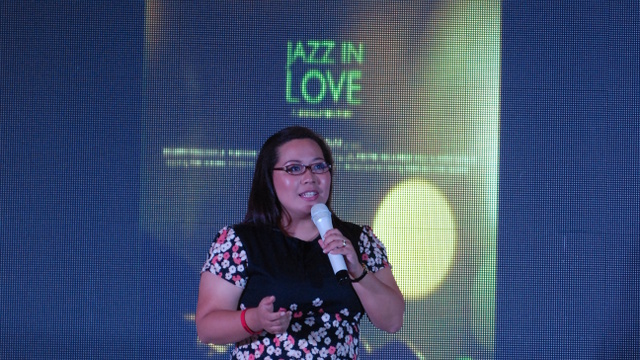SUMMARY
This is AI generated summarization, which may have errors. For context, always refer to the full article.
MANILA, Philippines – “Jazz in Love,” Babyruth Villarama’s romantic documentary, which opened Cinemalaya 2013, begins with shaky yet endearingly intimate shots of a phone call between Jazz, a young Filipino from the provinces, and Theo, his much older German boyfriend.
This film is another vibrant voice for the LGBT milieu, around the same time Pope Francis has expressed openness regarding gays. But for the director, love is universal and so this is, all told, a love story before anything else.
READ: Cinemalaya at Ayala Malls
Jazz is a wide-eyed man transformed by the vivid colors of young love, including the silhouettes of his profile and frame, and his route to happiness appears to have been secured.
All he needs to do is pass his German proficiency examination, await the oasis of his lover’s arms, and be rescued from the poverty of his milieu.
Jazz takes all the necessary preparations, in anticipation of an idealized lover who arrives practically from the heavens. Despite time and distance, despite the barrage of judging words from his immediate, terribly homophobic community, Jazz remains in the perpetual glory of love in his heart – enough to share that state of mind with a taxi driver.
Finally, all those days and nights of chatting and calling come to fruition, as Theo arrives, in the romanticized setting of an airport landing. He is bestowed such affection capped by cards, cakes, and candles.
Theo is a man embraced, despite his sardonic remarks dismissed as humor by the love-struck Jazz. Much of everything becomes taken for granted or assumes some new significance for this fool in love, from in-the-face ads to the popular lyrics sang off a barrio fiesta videoke machine.
Theo stands as an extension of Jazz’s goals and desires. And yet there’s the palpable setting of his aspirations, the realities in the countryside – as a whole lot more than the hapless handling of lechon can overwhelm his visitor from the progressive West.
There is a prevalent notion in the air that this homosexual May-December union is altogether trifling and foolish – this, even with the warm and curious welcome of Jazz’ family which shows that, no matter our prejudices, Filipino hospitality knows no bounds.
Jazz’s pantheon of love rises forth from Theo’s glittered promise. Yet, alas, the German lover finally becomes an emotionally unavailable object to so much of this idealism.
The thing with wide age differences is that misunderstandings are imminent. It’s not just the age, but also the culture. Not a few would expect that there can’t be any future between these two still very different people.
Theo might have been vocal about his apprehensions on growing old alone, although he has this relationship with Jazz that has lasted years online – to the point of Theo reaching out further from cyberspace, investing in his lover’s schooling and also twice visiting the Philippines.
Open-ended
Not all stories lead to a conventional conclusion, because the future is open and indefinite, and a sudden break doesn’t mean that things have already come to an end.
And as this movie ends, it’s likely that the audience will begin to speak ironically about their romance. Perhaps no one will suggest that it actually happened.
But these two are not mere characters in a story. They are real men caught in a romantic moment amid life’s routine and drudgery – individuals with their own back stories, to be accepted not as good or evil, but simply human beings who live their lives much like you and me.
Can I really blame the practical Theo, who doesn’t win my love just because, unlike Jazz, he may not share my sense of humor? Do I sympathize with young Jazz because he is a compatriot?
Amid these skepticisms about their character, both these people deserve understanding and respect. Theo may have loved Jazz in his own way. Ultimately, it behooves one to never judge these two, who both, after all, still have so much ahead in their lives.
These thoughts might also have been playing in the mind of Villarama, who regards Theo and Jazz as friends. Villarama says their story is “simply a story of life and love” – because love is beyond such categories as sexual orientation and age difference. Her statement is the boundary rendering moot the thought bubbles in our heads.
It’s a universally acknowledged truth that nobody falls in love expecting to not be torn apart.
From that understanding we proceed without expectations, and yet I find myself rooting and expecting much for Jazz – that he will still get his happily-ever-after, following everything that came before. Real love is happy-sad in its complexity. – Rappler.com
 Carla Camille L. Mendoza has worked as an operating room nurse, has written and produced segments for TV, and has been involved in publishing at her alma mater, the University of Santo Tomas. She is currently writing magazine features and is preparing to study law.
Carla Camille L. Mendoza has worked as an operating room nurse, has written and produced segments for TV, and has been involved in publishing at her alma mater, the University of Santo Tomas. She is currently writing magazine features and is preparing to study law.
Cinemalaya runs until August 4 at the CCP, TriNoMa, Greenbelt 3, and Alabang Town Center. An Awards Night at the CCP will cap this festival on that date. The screening schedule is available here.
Add a comment
How does this make you feel?

There are no comments yet. Add your comment to start the conversation.